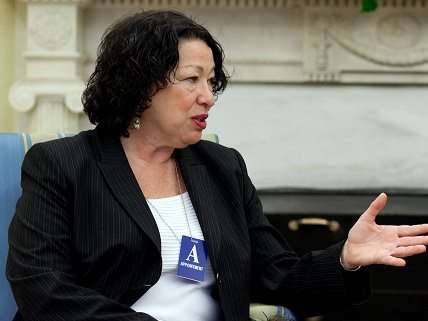Sonia Sotomayor Faults SCOTUS for Failing to Protect Right to Effective Counsel in Death Row Case
Justice Sotomayor dissents from the denial of certiorari in Wessinger v. Vannoy.

Today the U.S. Supreme Court declined to hear the appeal of a death row inmate whose state-appointed attorneys failed to discover and present mitigating evidence that might have altered the outcome of his jury trial. Writing in dissent, Justice Sonia Sotomayor faulted her colleagues for refusing to review this "deeply unjust and unfair" case. The Court's inaction, Sotomayor declared, "belies the 'bedrock principle in our justice system' that a defendant has a right to effective assistance of trial counsel, and undermines the protections this Court has recognized are necessary to protect that right."
The case of Wessinger v. Vannoy originated in 1997 when Todd Wessinger was found guilty of killing two people and sentenced to death. Yet as Justice Sotomayor pointed out, "Wessinger was sentenced to death by a jury that was never presented with significant mitigation evidence that may have convinced its members to spare his life," such as the fact that he "suffers from a major neurocognitive disorder that compromises his decision-making abilities" and "has a hole in the area of his brain associated with executive functioning that resulted from some form of cerebrovascular illness."
Wessinger's state-appointed lawyers failed to discover and present such evidence as their client's case wound its way through the Louisiana courts. As one of those lawyers later admitted under oath, his work was "inadequately investigated, rushly put together based on a civil lawyer's understanding of what to do, a first-year civil lawyer's understanding of what to do."
Represented by new lawyers at the federal level, Wessinger prevailed in 2015 before the U.S. District Court for the Middle District of Louisiana, which found that his counsel "at the penalty phase was deficient and fell below the objectively reasonable norms of capital counsel at a penalty phase." Furthermore, the district court said, "there is a reasonable probability that the evidence of [Wessinger's] brain damage and other impairments, as well as his personal and family history would have swayed at least one juror to choose a life sentence." The district court then vacated Wessinger's death sentence.
But the U.S. Court of Appeals for the 5th Circuit reversed that ruling, leaving Wessinger on death row. It was that 5th Circuit decision that the U.S. Supreme Court declined to review today, prompting Justice Sotomayor to take the rare step of publicly rebuking the other justices for declining to get involved.
"The layers of ineffective assistance of counsel that Wessinger received constitute precisely the type of error that warrants relief under this Court's precedent," Justice Sotomoyor maintained. "Yet, Wessinger will remain on death row without a jury ever considering the significant mitigation evidence that is now apparent. Because that outcome is contrary to precedent and deeply unjust and unfair, I dissent."
Justice Sotomayor's dissent from the denial of certiorari in Wessinger v. Vannoy is available here.


Show Comments (47)